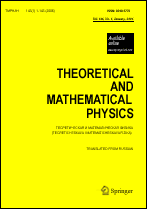|
This article is cited in 11 scientific papers (total in 11 papers)
Entanglement entropy of a near-extremal black hole
I. Ya. Aref'eva, I. V. Volovich, T. A. Rusalev
Steklov Mathematical Institute of Russian Academy of Sciences, Moscow, Russia
Abstract:
We study how the entanglement entropy of the Hawking radiation derived using the island recipe for the Reissner–Nordström black hole behaves as the black hole mass decreases. A general answer to the question essentially depends not only on the character of the mass decrease but also on the charge decrease. We assume a specific relation between the charge and mass $Q^2=GM^2[1-(M/\mu)^{2\nu}]$, which we call the constraint equation. We discuss whether it is possible to have a constraint such that the entanglement entropy does not blow up at the end of evaporation, as happens in the case of thermodynamic entropy and the entanglement entropy for the Schwarzschild black hole. We show that for some special scaling parameters, the entanglement entropy of radiation does not blow up if the mass of the evaporating black hole exceeds the Planck mass.
Keywords:
black holes, information paradox, Hawking radiation, island formula.
Received: 25.02.2022
Revised: 25.02.2022
Citation:
I. Ya. Aref'eva, I. V. Volovich, T. A. Rusalev, “Entanglement entropy of a near-extremal black hole”, TMF, 212:3 (2022), 457–477; Theoret. and Math. Phys., 212:3 (2022), 1284–1302
Linking options:
https://www.mathnet.ru/eng/tmf10273https://doi.org/10.4213/tmf10273 https://www.mathnet.ru/eng/tmf/v212/i3/p457
|


| Statistics & downloads: |
| Abstract page: | 341 | | Full-text PDF : | 118 | | References: | 52 | | First page: | 13 |
|




 Contact us:
Contact us: Terms of Use
Terms of Use
 Registration to the website
Registration to the website Logotypes
Logotypes









 Citation in format
Citation in format 
